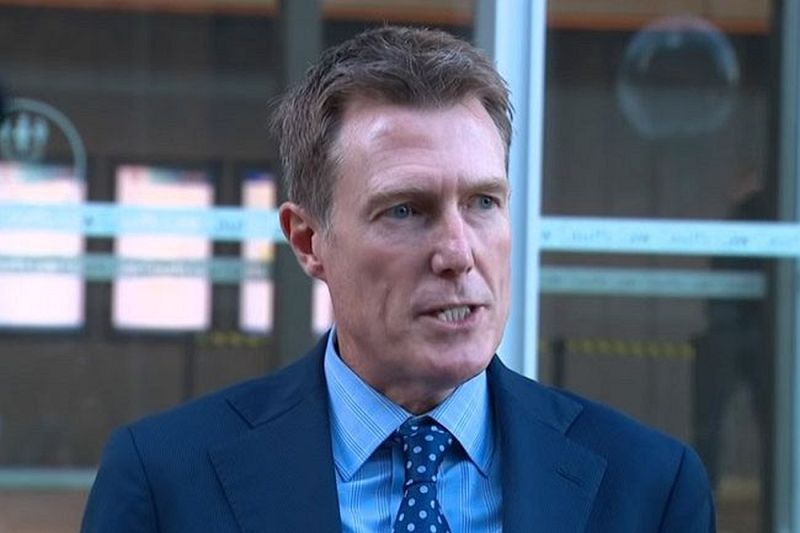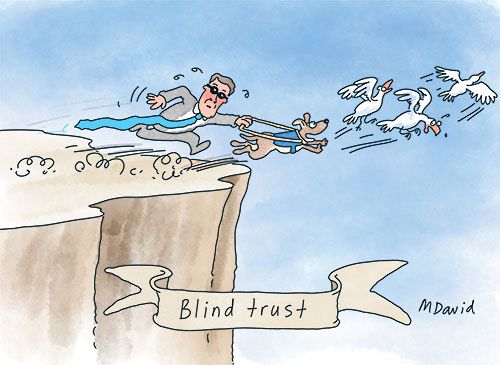Christian Porter left Parliament this week in the same way that he lived his entire life: privileged and certain that any slight against him was unwarranted.
His resignation statement certainly left little doubts to where his thoughts lay:
'Perhaps the only certainty now is that there appears to be no limit to what some will say or allege or do to gain an advantage over a perceived enemy.'
In 1999, Porter was asked by Cleo magazine in their bachelor of the year issue what most “mystified” him about women.
He stated:
'When you ask a girl "what’s wrong?" and she says "nothing" and you say "OK", you’re somehow being unreasonable.'
It is clear that the man born into Liberal party royalty never moved on from these wounded grievances. Instead he made a career of 'colossal misjudgements' that will forever tarnish his reputation. The contrasting farewells from across the political aisle towards Liberal Minister Greg Hunt, as opposed to Porter, is a sign of where his reputation lay: in tatters.
The downfall of Porter
For many readers, the former Attorney-General will be remembered for the unedifying and shocking events of this year. When historical rape allegations with a woman who took her own life in 2020 were aired, Porter presented himself as the minister accused in the story that was run by the Australian Broadcasting Corporation (ABC) along with other media organisations and strenuously denied the allegations.
It would have been easy for Porter to have kept his reputation intact: he simply should have stood down for the time being and allowed an investigation into these charges to take place. An independent inquiry may have struggled to find enough admissible evidence to find Porter responsible and he would have, in all likelihood, continued in his role as Attorney-General.
The Government, already mired in issues around women’s safety in Parliament and in their own party, would have justifiably been able to state they did everything required of them.
At the time, Monash University Associate Professor Luke Beck stated:
'It would not be at all unusual for Mr Porter to resign, be dismissed or stand aside pending the outcome of an independent inquiry.'
Instead Porter allowed the Prime Minister to accept his innocence and continue like everything was normal. The Australian used its editorial stance, along with writers such as Chris Merritt, to fawn over Porter and accuse “the mob” of attacking an innocent man. Conservative writer Caroline Di Russo laughably derided the inference of an independent inquiry, stating it would mean 'the rule of law was over'.
But Porter’s position wasn’t normal. It was the highest law official in the land. A minister should be beyond reproach and the Attorney-General even more so.
Porter took legal action against the ABC, in the process taking on a lawyer that had a conflict of interest. He settled the case, which cost him such large amounts of money, so he chose to take donations to help pay for his legal bills. Porter then refused to make public the identity of those donors.
When he eventually stood down from the Cabinet, his media statement railed against the unfairness of it all. In his statement, the inference was that he had been attacked for nothing. An innocent man who was destroyed. The reality was a tragedy without the anti-hero.
Porter's rise to the top
When he was in Western Australian Parliament, first as the State’s Attorney-General and then combining that role with being Treasurer, Porter’s politics were the epitome of a populist. Law and order was paramount. He questioned the deterrent value of soft penalties under the Young Offenders Act and suggested criminals should be banned from drinking alcohol, mixing with other offenders or even owning spray paint cans.
Adult offenders who helped the community with outdoor work were forced to wear dehumanising vests and he pledged to “die in a ditch” fighting then-Prime Minister Kevin Rudd’s proposed human rights charter.
Perth QC Tom Percy described Porter succinctly:
“He is an old-fashioned politician because he really has no new ideas at all.”
Porter introduced life imprisonment for charges of manslaughter and far stronger penalties for drug dealers and people who defaulted on their fines. Of the latter, more people went to prison than ever before for these comparatively minor offences. The "upshot" of all this was a huge increase in Indigenous incarceration rates. Porter opined that “imprisonment is a really important part of the criminal justice response”.
Percy was more nuanced:
... harsher penalties don’t prove anything and putting more people in jail does not prove anything either. But here he comes, not trying to find other solutions to crime, not finding other ways of dealing with people who need rehabilitation, but he is going to build another prison… because they are criminals and because they are human... it does not seem to matter to anyone, least of all the Attorney-General.
When he took up the role of his home State’s Treasurer, he oversaw a deterioration in Western Australia financial prospects, resulting in its eventual downgrading from a AAA rating. Porter saw the writing on the wall before the 2017 Election and was happy to nominate federally,successfully winning the seat of Pearce.
Porter's vexatious failure
Christian Porter’s role in Federal Parliament was such an unqualified failure it shames me to say that we share the same state of birth. In his first cabinet position, he oversaw the disastrous robodebt scheme. It resulted in 470,000 wrongfully issued debts and the government settling a lawsuit and repaying back $1.2 billion dollars.
At the time Porter said the illegal scheme was “working well". When it came to the most vulnerable, the most marginalised in the country, Porter was nowhere to be found. On the final day of the royal commission into institutional child abuse, something entirely in the remit of his portfolio, he skipped it to watch cricket with John Howard.
When Porter became Attorney-General his one "achievement" was destroying the Family Court. He didn’t listen to the majority of experts in the country who pilloried the decision, but he did listen to Pauline Hanson, who applauded it. The press gallery fawned over Porter, calling him Australia's next Prime Minister in cringeworthy profile pieces that ignored his flawed political history.
His prosecution of Witness K and Bernard Collaery, who both reported the unethical conduct of the Howard Government, flew in the face of his legislated role as a “model litigant.” In attempting to crush people who reported wrongdoing, Porter dragged the case out for so long that three magistrates lambasted him.
At every step, his vexatious behaviour in the case was shocking, if not expected. This was only matched by the majority of the media refusing to report on, let alone criticise, it. This behaviour was simply to show people who wanted to report injustice that the likelihood was a long time in a court room.
Porter’s flaws floated to the top in late 2020, when the ABC ran a Four Corners special: 'Bursting the Canberra Bubble'. Conservative critics derided it as a hit job but the highest law officer in the land was shown to act like a frat boy still partying when the music had stopped and the cleaners were mopping the floors.
Despite being married, he was accused of drunkenly kissing a political staffer in a bar and he was often drunk in public. Former Prime Minister Malcolm Turnbull said Porter’s behaviour had resulted in concern in the party room. Porter denied this like he denied all responsibility.
On the expose, former university colleague and barrister Kathleen Foley noted that:
“I’ve known him [Porter] to be someone who was in my opinion, and based on what I saw, deeply sexist and actually misogynist in his treatment of women, in the way that he spoke about women.”
The end of Christian Porter’s political career this week was swift.
As journalist Bernard Keane highlighted:
'It’s also worth noting that it is not his enemies that accounted for the end of his political career and his ambition to be Prime Minister, but Porter himself.'
There will be others like him: people of the bluest blood who cannot fathom that they have ever done anything wrong. A media that hails every minor political success as a gold medal and who refuses to call out multiple injustices perpetrated by them always helps. But the now twice divorced Porter will no doubt leave with the same self-assured swagger he had when he arrived: the unshakeable belief of a man born to rule.
After all, if you look good in a suit and no one asks too many questions, you can do a lot in Australian politics.
Dechlan Brennan is a freelance writer advocating for mental health and welfare reforms in Australia.
Related Articles
- On IA: Weekly recap — 11 November 2021
- Kings of defamation: Porter, Laming, Barilaro, Dutton et al
- Twitter fights against Porter, van Onselen and Laming’s defamation threats
- Grassroots campaign against Christian Porter grows
- Christian Porter’s dark blind trust: Nothing to see here!
 This work is licensed under a Creative Commons Attribution-NonCommercial-NoDerivs 3.0 Australia License
This work is licensed under a Creative Commons Attribution-NonCommercial-NoDerivs 3.0 Australia License
Support independent journalism Subscribe to IA.















